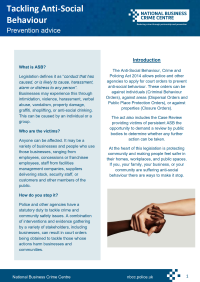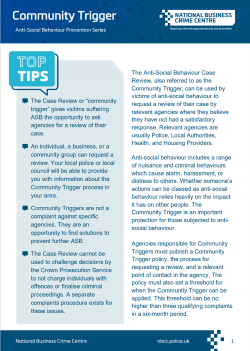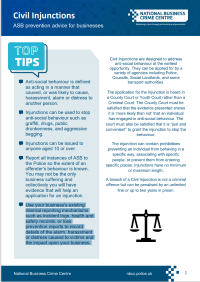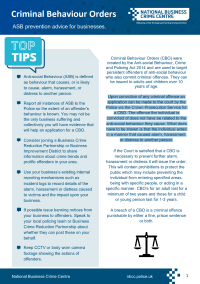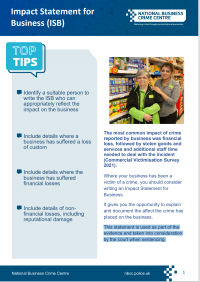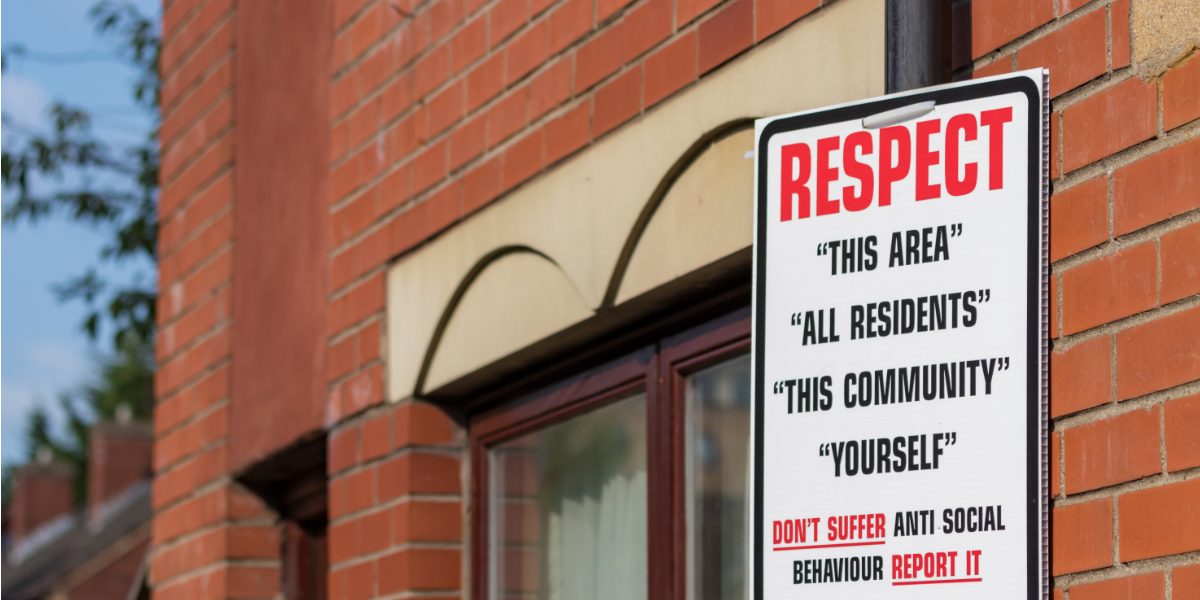
Anti-Social Behaviour
Anti-social behaviour (ASB) takes many forms and includes a range of nuisance and criminal behaviours which cause distress to others, and we know through engagement that it is becoming an increasing issue.
Many businesses suffer from the effects of anti-social behaviour but particularly it can impact small independent retailers. Small outlets in local communities can act as a hotspot for ASB causing mental, physical and financial harm to a business.
It can also impact the customers of the business and local community because of the price in increased costs of goods, higher insurance premiums and potential loss of investment by businesses in the local area.
Examples of ASB that could affect a business include:
- Nuisance, rowdy or inconsiderate neighbours
- Vandalism, graffiti and fly-posting
- Environmental damage such as littering, dumping of rubbish and abandonment of cars
- Threatening behaviours towards staff or customers
The NBCC website has a range of guidance and advice on how businesses can tackle and respond to ASB:
Tackling ASB
The Anti-Social Behaviour, Crime and Policing Act 2014 allows police and other agencies to apply for court orders to prevent anti-social behaviour. These orders can be against individuals (Criminal Behaviour Orders), against areas (Dispersal Orders and Public Place Protection Orders), or against properties (Closure Orders).
The act also includes the Case Review providing victims of persistent ASB the opportunity to demand a review by public bodies to determine whether any further action can be taken.
There is no one size fits all approach to stopping anti-social behaviour but there is a wealth of options available to provide respite to victims and make communities safer.
Find out what support is available to your business if you are suffering from ASB:
Community Triggers
The Anti-Social Behaviour Case Review, also referred to as the Community Trigger, can be used by victims of anti-social behaviour to request a review of their case by relevant agencies where they believe they have not had a satisfactory response. Relevant agencies are usually Police, Local Authorities, Health, and Housing Providers.
An individual, a business, or a community group can request a review. Your local police or local council will be able to provide you with information about the Community Trigger process in your area.
Click on the image below to donwload a copy of the Community Triggers guidance:
Civil Injunctions
Civil Injunctions are designed to address anti-social behaviour at the earliest opportunity. They can be applied for by a variety of agencies including Police, Councils, Social Landlords, and some transport authorities.
The injunction can contain prohibitions preventing an individual from behaving in a specific way, associating with specific people, or prevent them from entering specific places. Injunctions have no minimum or maximum length.
Gathering evidence to support a Civil Injunction is a key part of the process. Use the business’s existing internal reporting mechanisms to record evidence such as incident logs, health and safety records, or loss prevention reports to record details of the alarm, harassment or distress caused to victims and the impact upon your business.
Find out more about Civil Injunctions and what you can do to make the case for the injunction as strong as possble:
Criminal Behaviour Orders
Criminal Behaviour Orders (CBO) were created by the Anti-social Behaviour, Crime and Policing Act 2014 and are used to target persistent offenders of anti-social behaviour who also commit criminal offences. They can be issued to adults and children over 10 years of age.
Upon conviction of any criminal offence an application can be made to the court by the Police via the Crown Prosecution Service for a CBO. The offence the individual is convicted of does not have be related to the anti-social behaviour they cause. What does have to be shown is that the individual acted in a manner that caused alarm, harassment, or distress to another person.
The NBCC guide to CBOs explains more about how CBOs are used and the role a business can play in gathering evidence to support them.
Impact Statement for Business (ISB)
Where your business has been a victim of a crime, you should consider writing an Impact Statement for Business.
It gives you the opportunity to explain and document the affect the crime has placed on the business. This statement is used as part of the evidence and taken into consideration by the court when sentencing.
Our guide explains the importance of an ISB and how to write one:
For more information or support you can email the NBCC team at contact@nbcc.police.uk
